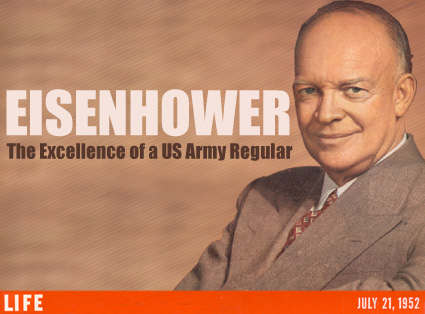| |
Ike was 1950s America's Commander
in Chief. He never puffed pot, tooted coke, tried to rap,
cheated on Mamie, or got clipped for drunk driving. He
was good Kansas stock - tough enough to beat the pants
off Hitler in WWII but as wise with a smile as everyone's
favorite uncle.
General Eisenhower commanded the Allied
invasion of North Africa in 1942 and was Supreme Commander
for the D-Day invasion of France in 1944. As President,
he was both a sharp-eyed Hawk, military lightning at
the ready in his right hand, and an evangelical Dove,
preaching the Book of Peace in his left - in short,
an all together different breed from the ravens and
pigeons feathering their nests in Washington today.
 Life
magazine captures the war hero in July of 1952, as he
rallies a surge of optimism and the Presidential nomination
from a Republican Party that had not put a man in the
Oval Office since Herbert Hoover in 1933. Life
magazine captures the war hero in July of 1952, as he
rallies a surge of optimism and the Presidential nomination
from a Republican Party that had not put a man in the
Oval Office since Herbert Hoover in 1933.
His domestic policy stressed strong federal
leadership. U.S. foreign policy under Eisenhower valued
high readiness, diplomatic continuity and the virtues
of peace and partnership. In the national battle of
wills against the USSR, he was America's front line
of common sense, faith and ready courage. Sound thinking
and plain spoken, today his words, especially the famous
Farewell Address of 1961, provide a remedy for the tone-deaf
rhetoric, diplomatic disengagement and policy incoherence
of today's Rogue Elephant Republicans.
"I hate war as only a soldier who
has lived it can, only as one who has seen its brutality,
its stupidity." January 10, 1946
Selections from the Farewell Radio and
Television Address to the American People by President
Dwight D. Eisenhower, January 17, 1961:
|
|
| |
My fellow Americans:
...
We now stand ten years past the midpoint of a century
that has witnessed four major wars among great nations.
Three of these involved our own country. Despite these
holocausts America is today the strongest, the most influential
and most productive nation in the world. Understandably
proud of this pre-eminence, we yet realize that America's
leadership and prestige depend, not merely upon our unmatched
material progress, riches and military strength, but on
how we use our power in the interests of world peace and
human betterment.
...
Crises there will continue to be. In meeting them, whether
foreign or domestic, great or small, there is a recurring
temptation to feel that some spectacular and costly action
could become the miraculous solution to all current difficulties.
...
Good judgment seeks balance and progress; lack of it eventually
finds imbalance and frustration.
...
The record of many decades stands as proof that our people
and their government have, in the main, understood these
truths and have responded to them well, in the face of
stress and threat. But threats, new in kind or degree,
constantly arise. I mention two only.
A vital element in keeping the peace is our military
establishment. Our arms must be mighty, ready for instant
action, so that no potential aggressor may be tempted
to risk his own destruction.
...
Our military organization today bears little relation
to that known by any of my predecessors in peace time,
or indeed by the fighting men of World War II or Korea.
Until the latest of our world conflicts, the United
States had no armaments industry. American makers of
plowshares could, with time and as required, make swords
as well. But now we can no longer risk emergency improvisation
of national defense; we have been compelled to create
a permanent armaments industry of vast proportions.
Added to this, three and a half million men and women
are directly engaged in the defense establishment. We
annually spend on military security more than the net
income of all United State corporations.
This conjunction of an immense military establishment
and a large arms industry is new in the American experience.
The total influence - economic, political, even spiritual
- is felt in every city, every state house, every office
of the Federal government. We recognize the imperative
need for this development. Yet we must not fail to comprehend
its grave implications. Our toil, resources and livelihood
are all involved; so is the very structure of our society.
In the councils of government, we must guard against
the acquisition of unwarranted influence, whether sought
or unsought, by the military-industrial complex. The
potential for the disastrous rise of misplaced power
exists and will persist.
...
We must never let the weight of this combination endanger
our liberties or democratic processes.
...
(Ike also cites the research-academic complex, warning
them against trendy leftism)
Yet, in holding scientific research and discovery in
respect, as we should, we must also be alert to the
equal and opposite danger that public policy could itself
become the captive of a scientific-technological elite.
...
Another factor in maintaining balance involves the element
of time. As we peer into society's future, we-you and
I, and our government-must avoid the impulse to live
only for today, plundering, for our own ease and convenience,
the precious resources of tomorrow. We cannot mortgage
the material assets of our grandchildren without risking
the loss also of their political and spiritual heritage.
We want democracy to survive for all generations to
come, not to become the insolvent phantom of tomorrow.
...
Down the long lane of the history yet to be written
America knows that this world of ours, ever growing
smaller, must avoid becoming a community of dreadful
fear and hate, and be, instead, a proud confederation
of mutual trust and respect.
...
Such a confederation must be one of equals. The weakest
must come to the conference table with the same confidence
as do we, protected as we are by our moral, economic,
and military strength. That table, though scarred by
many past frustrations, cannot be abandoned for the
certain agony of the battlefield.
...
Disarmament, with mutual honor and confidence, is a
continuing imperative. Together we must learn how to
compose difference, not with arms, but with intellect
and decent purpose.
...
So-in this my last good night to you as your President-I
thank you for the many opportunities you have given
me for public service in war and peace.
...
To all the peoples of the world, I once more give expression
to America's prayerful and continuing inspiration:
We pray that peoples of all faiths, all races, all
nations, may have their great human needs satisfied;
that those now denied opportunity shall come to enjoy
it to the full; that all who yearn for freedom may experience
its spiritual blessings; that those who have freedom
will understand, also, its heavy responsibilities; that
all who are insensitive to the needs of others will
learn charity; that the scourges of poverty, disease
and ignorance will be made to disappear from the earth,
and that, in the goodness of time, all peoples will
come to live together in a peace guaranteed by the binding
force of mutual respect and love.
DWIGHT D. EISENHOWER
|
|




 Life
magazine captures the war hero in July of 1952, as he
rallies a surge of optimism and the Presidential nomination
from a Republican Party that had not put a man in the
Oval Office since Herbert Hoover in 1933.
Life
magazine captures the war hero in July of 1952, as he
rallies a surge of optimism and the Presidential nomination
from a Republican Party that had not put a man in the
Oval Office since Herbert Hoover in 1933. 